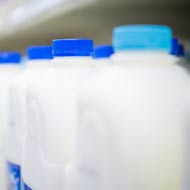First Milk to cut staff and milk prices

Member payments will be reduced by £3.3m overall.
Dairy company First Milk is proposing to cut 70 staff and reduce milk prices by an average of 0.33 pence per litre (ppl). The move is part of a 'turnaround plan' to stabilise the business after the collapse of the dairy markets.
Rapidly falling milk prices have created a crisis in the dairy farming industry, with 60 UK farmers leaving the business in December last year alone. The situation is due in part to a Russian trade ban with the EU, coupled with an oversupply of milk and reduced demand from China.
From 1 June 2015, First Milk will introduce a new milk pricing structure, meaning the amount paid to farmers will vary across the UK, according to location and commercial returns.
The B price for April has been confirmed as 16.1ppl and, based on projections, the price for June is expected to be 14-17ppl. The pricing changes are part of a £3.3 million reduction in member payments overall.
Mike Gallacher was appointed as First Milk's CEO last month. He said: "None of the decisions announced today (1 May) have been taken lightly, but they are necessary steps in the process of rebuilding a secure and stable future for First Milk, its members and its employees.
"As a team, our aim will be to provide every support for those impacted in the coming months."
Commenting on the news, Rob Harrison, chairman of the National Farmers Union dairy board, implored First Milk to "do all they can to increase both the A and B price for these farmers."
Mr Harrison said that while he understands First Milk's drastic actions, "this news on milk prices brings little or no comfort to some members across England and Wales who have supported them over the years…
“We all want to see a secure future for First Milk but this should not be done at the expense of their members. I, and my board, have spoken to a number of them who feel they have no other option but to leave the industry."
Proposals to cut 70 staff from the business have been communicated to First Milk employees and a consultation will follow. Up to 50 per cent of the job roles to be cut are within head office and support teams.
An independent review will also be carried out to assess First Milk's recent disappointing performance. A series of recommendations are expected to be shared in summer 2015. The review will be modelled on the recent Myners review of the Co-op.



 The latest
The latest